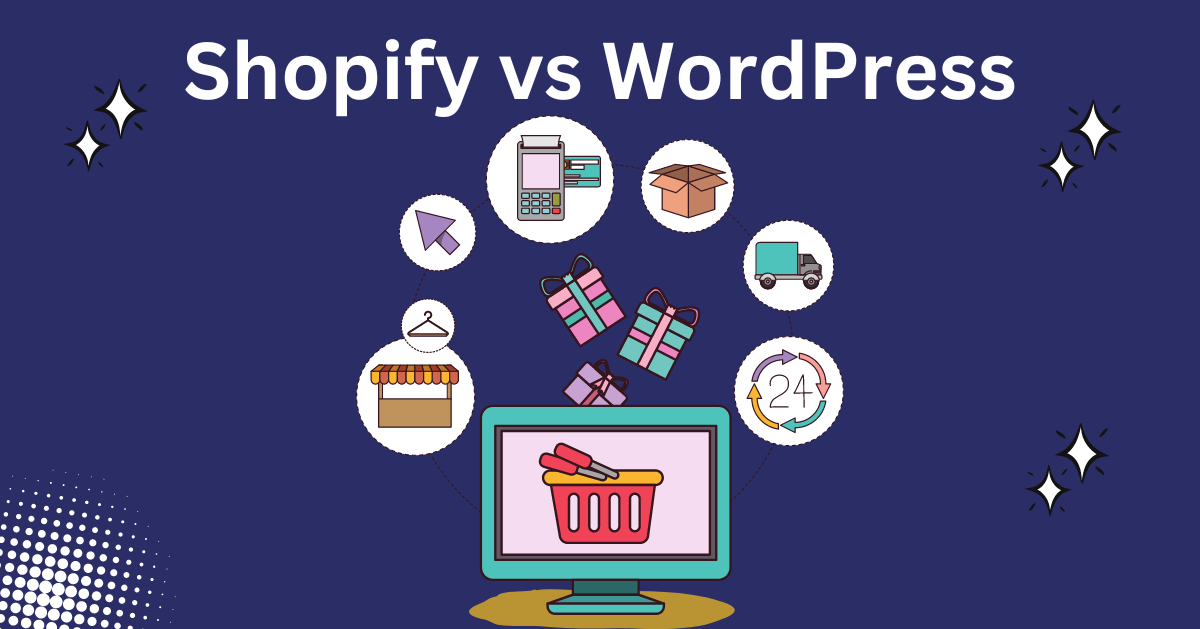When it comes to building an online store in 2024, choosing the right platform is crucial. Shopify and WordPress are two popular options, but they cater to different needs. Shopify offers a hassle-free, e-commerce-focused experience, ideal for those seeking a straightforward online store.
On the other hand, WordPress provides flexibility and versatility, making it perfect for creating various types of websites, including blogs, portfolios, and e-commerce sites with WooCommerce. By comparing Shopify or WordPress, we’ll help you understand which platform aligns better with your online business goals.
In this article, we’ll provide you with the latest insights and a clear, jargon-free explanation to make your decision easier.
Related post : 7 Reasons Why Everything in Tech Seems to Be Collapsing at Once
Table of Contents
ToggleShopify Vs WordPress for Ecommerce -What Are The Key Differences And Similarities ?
When it comes to setting up shop online in 2024, the Shopify vs. WordPress debate is more relevant than ever. Both platforms have carved niches for themselves, but understanding their key differences and similarities is crucial for making an informed decision.
Let’s break it down:
Shopify’s Ecommerce-First Approach:
Shopify shines as the streamlined choice for ecommerce. Its design caters specifically to online selling, offering a user-friendly setup right out of the box. With essential ecommerce functionalities built in, Shopify is ideal for those looking to launch their online store with minimal fuss.
WordPress: A Journey from Blogging to Ecommerce:
WordPress has evolved from a blogging platform to a versatile tool for building various types of websites, ecommerce included. By integrating the WooCommerce plugin, WordPress steps into the ecommerce realm, boasting extensive customization capabilities. This route is perfect for those who desire a tailor-made online presence, albeit with a steeper learning curve and more hands-on setup.
The Hosting Divide:
A significant distinction comes in the form of hosting. Shopify, as a hosted platform, simplifies the technicalities of running an online store by managing everything from updates to maintenance. This ease is a boon for entrepreneurs who’d rather focus on their business than backend issues. WordPress, on the other hand, is self-hosted, meaning you’ll need to handle the hosting, updates, and maintenance yourself. This grants more control but requires a willingness to get hands-on with the technical aspects.
These key differences highlight Shopify’s focus on ease and convenience, while WordPress caters to those seeking more control and customization in their online ventures.
Advantages of Using Shopify for Your Ecommerce Site
Choosing Shopify for your online store comes with several advantages. Here’s a look at some of the key benefits that make Shopify a preferred choice for many ecommerce entrepreneurs:
User-Friendly Interface:
Shopify stands out with its intuitive interface, making digital storefronts a breeze to set up and manage, regardless of your tech prowess. This accessibility is a game-changer for novices and experts alike.
Integrated Ecommerce Tools:
The platform comes with a variety of built-in tools essential for ecommerce. This includes payment processing, inventory management, and shipping options, simplifying the process of running an online store.
Reliable Hosting and Security:
Shopify takes care of hosting, ensuring your site is fast and reliable. It also prioritizes security, offering SSL certificates and secure payment gateways, which is vital for protecting customer data.
Mobile Responsiveness:
With mobile commerce on the rise, Shopify’s mobile-responsive designs ensure your store looks great and functions well on all devices, enhancing the customer experience.
24/7 Support:
Shopify provides round-the-clock customer support. Whether you encounter a technical issue or need guidance, help is always available.
App Store for Additional Features:
Shopify’s App Store allows you to extend your store’s functionality with various apps. Whether you need marketing tools, SEO assistance, or customer loyalty features, there’s an app for almost everything.
Marketing and SEO Tools:
The platform offers built-in marketing tools, including email marketing and social media integration. Additionally, it’s equipped with SEO features to help improve your store’s visibility in search engine results.
Scalability:
As your business expands, Shopify’s scalable plans and flexible add-ons adapt to your needs, supporting growth from startup to enterprise level. In essence, Shopify offers a comprehensive, user-friendly solution for effortless e-commerce setup.
Its all-in-one package combines ease of use, robust tools, and dependable support, making it an attractive choice for anyone entering the online selling space.
Shopify Limitations
While Shopify offers many benefits, it’s important to consider its limitations as well. Understanding these constraints can help you determine if Shopify aligns with your specific e-commerce needs.
Transaction Fees and Plan Costs:
Shopify charges transaction fees on sales unless you use Shopify Payments. Additionally, its monthly plans, while varied, can be a significant expense for small businesses or startups operating on a tight budget.
Customization Limits:
While Shopify provides customization options, they are somewhat limited compared to open-source platforms. Advanced customization often requires knowledge of Shopify’s coding language, Liquid.
SEO: A Step Behind:
Though Shopify equips you with basic SEO tools, it falls short of the expansive SEO capabilities offered by platforms like WordPress, a point to ponder for those reliant on organic search traffic.
Advantages of Using WordPress for Your Ecommerce Site
WordPress, especially when coupled with WooCommerce, offers a range of benefits for e-commerce websites. Here are some of the key advantages that make WordPress a popular choice:
Extensive Customization:
WordPress stands out for its limitless customization options. With thousands of themes and plugins, you can tailor your site to match your exact vision and requirements.
Strong Content Management Capabilities:
As a platform initially built for blogging, WordPress excels in content management. This makes it ideal for integrating ecommerce with robust content strategies, like blogging, portfolios, and more.
SEO Advantage:
WordPress is known for its superior SEO capabilities. The platform offers a wide range of SEO plugins and tools, allowing for detailed optimization to improve search engine rankings.
Flexibility and Control:
The open-source nature of WordPress gives you complete control over your website. You can modify and customize every aspect of your site, which is perfect for those who have specific needs or a clear vision.
Large Community and Support:
WordPress has a vast community of developers and users. This community provides extensive support through forums, tutorials, and guides, making it easier to find help and resources.
Cost-Effectiveness:
WordPress itself is free, and many plugins and themes are either free or relatively inexpensive. This can make it a more cost-effective option, especially for startups or small businesses with limited budgets.
Integration with Various Tools:
WordPress integrates well with a wide array of tools and services, from email marketing to CRM systems, enhancing its functionality and efficiency.
Ecommerce Flexibility with WooCommerce:
WooCommerce, the primary ecommerce plugin for WordPress, offers significant flexibility for online selling. It includes various features for managing products, payments, shipping, and more, while also being highly customizable.
WordPress, with its flexibility, strong content management, and SEO capabilities, is a great choice for those who need more than just an ecommerce platform. It’s particularly suited for businesses that also focus on content creation and require a high degree of customization.
Some WordPress Limitations
While WordPress offers significant benefits, especially for content-rich websites and those requiring high customization, it’s important to be aware of its limitations, particularly when used for ecommerce:
Technical Knowledge Required:
WordPress is not as straightforward as some dedicated ecommerce platforms. Setting up and managing a WordPress site, especially with WooCommerce, often requires a fair amount of technical knowledge or the willingness to learn.
Maintenance and Security:
Being a self-hosted platform, WordPress requires you to manage your own hosting, updates, and security. This can be a challenge for those without technical expertise and may require additional resources or external help.
Costs Can Add Up:
Although WordPress is free to use, the costs for premium themes, plugins, hosting, and potential developer assistance can accumulate, making it potentially more expensive than anticipated.
SEO Learning Curve:
While WordPress offers excellent SEO capabilities, effectively utilizing these tools often requires a deeper understanding of SEO best practices.
Limited Support:
WordPress does not offer dedicated support in the same way as some ecommerce platforms. Support is community-driven, which can be variable in terms of responsiveness and expertise.
WordPress offers great flexibility and customization but comes with its own set of challenges. It requires more hands-on management, technical knowledge, and can involve additional costs and effort to maintain. These factors are important to consider for businesses evaluating WordPress as their ecommerce solution.
Which Platform is Best for You?
Deciding whether Shopify or WordPress is the right platform for your ecommerce business depends on several factors. Here’s a guide to help you choose based on your specific needs and circumstances:
Your Technical Skill Level:
If you have limited technical skills or prefer a more straightforward, user-friendly platform, Shopify is likely the better choice. It’s designed for ease of use and quick setup.
For those comfortable with technical details and who enjoy customizing every aspect of their site, WordPress offers the flexibility and control you might be looking for.
Your Primary Focus:
If ecommerce is your main focus and you want a platform that’s specifically built for online selling, Shopify provides all the necessary tools in one package.
If your website is more content-focused, or if you want a combination of blogging, portfolio display, and ecommerce, WordPress is more suitable.
Budget Considerations:
Shopify comes with a monthly subscription fee, but this includes hosting and maintenance. Consider this if you prefer a predictable cost structure.
WordPress may have lower initial costs but remember to factor in the expenses for hosting, themes, plugins, and potential development help.
Long-Term Goals:
For scaling businesses that might grow rapidly, Shopify’s scalability and support can be invaluable.
WordPress is ideal for those who anticipate a need for extensive customization or specific functionality that might not be available on Shopify.
Maintenance and Security:
If you prefer not to deal with the technicalities of maintaining and securing a website, Shopify’s hosted solution takes care of these aspects.
If you’re ready to handle or outsource site maintenance and security, WordPress offers the flexibility of a self-hosted platform.
SEO and Marketing:
Shopify has built-in SEO and marketing tools, but they are somewhat limited compared to what you can achieve with WordPress plugins.
WordPress, renowned for its SEO strengths, is ideal if you plan to heavily rely on content marketing and search engine optimization.
Ultimately, the choice between Shopify and WordPress comes down to your specific business needs, technical ability, budget, and long-term vision. Both platforms have their strengths and can support successful e-commerce businesses, but aligning their features with your goals is key to making the right decision.
Frequently Asked Questions
When considering Shopify and WordPress for your ecommerce venture, several common questions may arise. Addressing these can provide further clarity and assist in your decision-making process:
Can I switch from Shopify to WordPress or vice versa?
Yes, it’s possible to switch platforms, but the process can be complex. Moving from Shopify to WordPress requires data export and import, theme redesign, and setting up ecommerce functions afresh. The reverse involves similar challenges. It’s important to plan thoroughly to ensure a smooth transition.
Do I need to know how to code to use Shopify or WordPress?
Shopify does not require coding knowledge for basic setup and use, making it ideal for beginners. WordPress, while user-friendly, might require some coding for advanced customization, especially when using WooCommerce.
Which platform is better for SEO?
WordPress is generally considered superior for SEO due to its extensive customization options and a wide array of SEO plugins. However, Shopify also offers basic SEO features that are sufficient for most stores.
Can I use my own domain name with both Shopify and WordPress?
Yes, both Shopify and WordPress allow you to use a custom domain name. Shopify offers domain registration services, while WordPress requires you to purchase a domain from a third-party provider.
How does hosting work with Shopify and WordPress?
Shopify is a hosted platform, meaning it provides hosting as part of its service. With WordPress, you need to arrange your own hosting, which offers more control but requires additional setup and maintenance.
Which platform offers better customer support?
Shopify is known for its excellent 24/7 customer support, accessible via phone, email, or live chat. WordPress relies on community support through forums and online resources, which can vary in responsiveness.
Conclusion
Choosing between Shopify and WordPress? It’s all about what you need and how techy you are. Shopify is super simple, perfect for beginners or those who don’t want to deal with tech stuff. It has everything for running your store easily.
WordPress, with WooCommerce, offers more control and is great for adding blogs to your shop. It needs more tech skills or maybe some help. Both are great; it’s just about whether you prefer Shopify’s simplicity or WordPress’s flexibility. Use their strengths to grow your online business.










